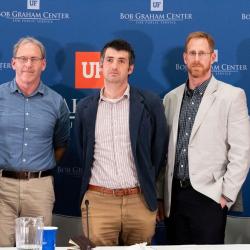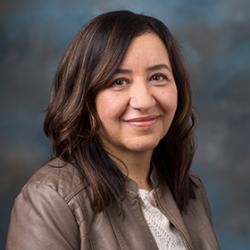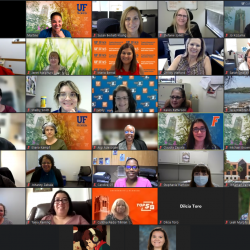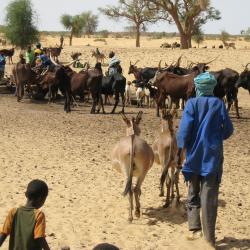Debra Lyon, PhD, RN, FNP-BC, FNAP, FAAN, Executive Associate Dean and Kirbo Endowed Chair, College of of Nursing has been named a Sigma Theta Tau International Honor Society of Nursing International Nurse Researcher Hall of Fame inductee. Lyon joins a select cohort of 32 world-renowned nurse researchers who will be formally inducted during the organization’s 33rd International Nursing Research Congress in Edinburgh, Scotland, in July.
Prof. Elizabeth Washington is the most recent awardee who will represent the University of Florida under a Fulbright Award 2022-2023.
Elizabeth Yeager Washington is Professor and Coordinator of Secondary Education and Social Studies Education at the UF College of Education. She is also an Affiliate Faculty Member of the Teachers, Schools, and Society EdD Program, and an Affiliate Faculty Member of the UF Bob Graham Center for Public Service. She teaches courses in secondary social studies methods, critical democratic citizenship education, and effective teaching and classroom management. Her research interests include civic education, critical democratic citizenship education, the...
Trémolières M, Walther O, Radil S. (2022), Borders and Conflicts in North and West Africa, West African Studies, OECD Publishing, Paris, https://doi.org/10.1787/6da6d21e-en.
This report examines the increasing importance of North and West African border regions in the development...
Scholars offer historical, political, and cultural perspectives on Russia’s invasion
By Lauren Barnett — March 7, 2022
Source: UF News
As the campus community watches and reacts to unfolding scenes of Russia’s invasion of Ukraine, a panel of UF College of Liberal Arts and Sciences professors came together to try to make sense of it all, sharing their diverse expertise to provide clarity on the conflict.
On the evening of March 1, the College of Liberal Arts and Sciences, with additional support from UF’s Bob Graham Center for Public Service and the Center for European...
Source: South Dade News Leader
Samira Daroub, an internationally acclaimed soil and water scientist and professor, has been named director of the UF/IFAS Everglades Research & Education Center (EREC).
Daroub is the second woman in the history of the 100-year-old center to take the helm. The center’s campus includes offices, laboratories, greenhouses, a 700-acre research farm, and residential dormitories and housing for graduate students and visiting...
GAINESVILLE, FL, 3/2/2022 – The University of Florida is proud to be included on the list of U.S. colleges and universities that produced the largest number of 2021-2022 Fulbright U.S. Scholars. Each year the U.S. Department of State’s Bureau of Educational and Cultural Affairs (ECA) announces the top-producing institutions for the Fulbright Program, the U.S. government's flagship international educational exchange program. The Chronicle of Higher Education publishes the lists in its online and print editions.
Seven UF scholars were awarded Fulbright awards for 2021-2022, ranking the University of Florida in a tie for 4th place, more than any other university of its type in the...
Last week, the UFIC ISS team held an Immigration 101 Workshop that discussed F-1 student regulations. 49 registrants attended the workshop, numbers that had not been seen since before the pandemic. Kudos to UFIC facilitators: Martine Angrand and Candice DeBose-Tyson! And thank you to everyone that came out and for your dedication to our Global Gators!
weTree is one of the initiatives that emerged from the Circular Health Program, and seeks to combine recognition of women, awareness on the importance of green areas in cities and towns, and engagement between municipalities and citizens on improving the urban environment through dedicated projects.
This initiative has three goals:
| ▪ | developing green areas dedicated to women who have distinguished themselves actively working for a better society, |
Image Description: People and animals at a well in Niger with sparse trees in the background
A team of University of Florida (UF) faculty members has been awarded a grant of $1.6 million to study the impact of climate change in West Africa, the Minerva Research Initiative announced on Friday 24 February 2022. The...
Image Description: the Ukrainian flag, with its blue and yellow color, as a paint stroke on a white background
NAFSA Stands with Ukraine
Source: Nafsa.org
"As you know, our worst fears have been realized and Ukraine is now under siege. As NAFSA executive director and CEO Esther Brimmer, DPhil. conveyed in a statement, “We share the world’s outrage over Russia’s invasion of Ukraine and feel deeply for all who are caught in the crossfire and those with ties to the region. This is a shameful act of aggression, and our thoughts are with all who will...










